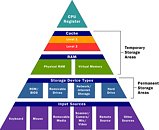Wednesday, August 15th 2018

New "L1 Terminal Fault" Security Vulnerability Affects Intel Processors, Mitigation Out
A new series of CPU vulnerabilities affecting Intel processors emerged from the company's security bounty-hunter program, which are an exploitation of the L1 terminal fault. The vulnerability affects Intel processors that support SGX (Software Guard Extensions). A multinational group of researchers from KU Leuven University, Technion - Israel Institute of Technology, University of Michigan, University of Adelaide and Data61 chronicled the vulnerability. The exploit involves interpreting and deriving data from timing the L1 cache. You'll recall that NetSpectre was a similar timing-based bit derivation exploit, what's being measured here instead, is how the L1 cache SRAM refreshes itself to different patterns of bits, and transcribing them to bits and bytes on the other end. We imagine a mitigation to this bug would be to randomize the L1$ timers.
Intel these days is releasing CPU microcode updates faster than King updates Candy Crush with new offline banner ads. The company was sure to have a mitigation for this vulnerability ready before disclosing it to the public. The company, in a statement, said that it's working tireless to get customers to install the updates. The three variants of the L1 Timing Fault vulnerability are chronicled in CVE-2018-3615, CVE-2018-3620, and CVE-2018-3646.Intel's briefs for each of the three vulnerabilities follows:
Intel these days is releasing CPU microcode updates faster than King updates Candy Crush with new offline banner ads. The company was sure to have a mitigation for this vulnerability ready before disclosing it to the public. The company, in a statement, said that it's working tireless to get customers to install the updates. The three variants of the L1 Timing Fault vulnerability are chronicled in CVE-2018-3615, CVE-2018-3620, and CVE-2018-3646.Intel's briefs for each of the three vulnerabilities follows:
- L1 Terminal Fault-SGX (CVE-2018-3615)-Systems with microprocessors utilizing speculative execution and Intel SGX may allow unauthorized disclosure of information residing in the L1 data cache from an enclave to an attacker with local user access via side-channel analysis.
- L1 Terminal Fault-OS/ SMM (CVE-2018-3620)-Systems with microprocessors utilizing speculative execution and address translations may allow unauthorized disclosure of information residing in the L1 data cache to an attacker with local user access via a terminal page fault and side-channel analysis.
- L1 Terminal Fault-VMM (CVE-2018-3646)-Systems with microprocessors utilizing speculative execution and address translations may allow unauthorized disclosure of information residing in the L1 data cache to an attacker with local user access with guest OS privilege via a terminal page fault and side-channel analysis

48 Comments on New "L1 Terminal Fault" Security Vulnerability Affects Intel Processors, Mitigation Out
Is that right?
Regarding AMD's exposure to this specific issue:
That said, BOTH companies need to address these issues, on a hardware level, as soon as possible.
same as intel avoid 7 generation of their Core series Architecture flaw, the bug is on Hardware based, AMD is on different animal, not the same, Ryzen is newly fresh Architecture unlike Core series which is from more than decade ago,, as anything report AMD is very minimal impact compare to Intel, that cant be FIXED by software, they making patch for this, is same when your car tire broken and just add temporary patch before actual HARDWARE level fix applied aka replacing the architecture
AMD has the better product, period.
I'm not sure if, @ least on server products (since these are the most affected) the speculative execution portion shouldn't be outright removed, from both camps: it's problem after problem after problem, and all the mitigations for the various issues combined have a serious impact on performance and i'm not sure if it's impact is greater than the performance benefits speculative execution brings.
~25% is huge hit in VMs (and who know how much more now). In fact, just got word...a huge fortune 500 is going AMD from this circus of intel flaws.
I dont think so. And how many micro-code updates did Intel CPU's had by now. As written above consumers dont really get much out of those updates which could tamper performance, but on large (DC) scale a 5 up to 15% hit is considered as very huge.
Still, this whole speculative execution part of the processors should be removed from future processors, from both camps: too many problems, IMO.